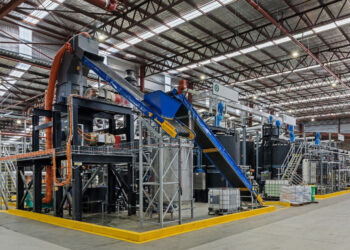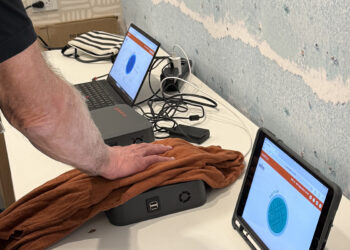The aluminum recycling industry continues to push for new beverage container deposit programs, with an executive pointing to potential in the Upper Midwest and in the nation’s capital.
The Aluminum Association on April 25 held a press briefing in conjunction with the group’s spring meeting in White Sulphur Springs, W.Va. The briefing included leaders from the association and aluminum companies Tri-Arrow Aluminum, Constellium Rolled Products and Commonwealth Rolled Products.
Henry Gordinier, president and CEO of Louisville, Ky.-based Tri-Arrows, which recycles used beverage cans (UBCs) into sheets for making cans, said that since the Aluminum Association and Can Manufacturers Institute (CMI) launched their campaign to lobby for bottle bills, the industry “has been firing on all cylinders to advocate for these policies.”
Container deposit programs, which are currently in place in 10 U.S. states, are one strategy the industry is pushing to increase the supply of UBC scrap available to can manufacturers and thus reduce their greenhouse gas (GHS) impacts.
Gordinier pointed to progress in the legislatures in Illinois and Minnesota, while also mentioning that Maryland lawmakers held a hearing recently on recycling refunds. He also noted that U.S. Sen. Jeff Merkley, a Democrat from Oregon, is working to introduce legislation for a national bottle deposit program.
“There is strong bipartisan support for recycling refund programs,” he said, adding that states with bottle bills have aluminum can recycling rates nearly double those in states without them.
CMI and the Illinois Environmental Council (IEC) on April 27 issued a press release cheering on the holding of a hearing on Senate Bill 85, which would create a beverage container redemption program in the state. The legislation would place a 10-cent deposit on containers of 24 ounces or less and 15 cents on containers of over 24 ounces.
Widespread support but limited implementation
When asked how bottle bills could truly have bipartisan support when, decades after the first came on-line, only ten (plus one in the territory of Guam) exist, Gordinier pointed to the difficulty of moving big changes through state government. But he said public opinion research commissioned by the industry shows over 80% support for bottle bills from Democrats and over 75% from Republicans, with independents in the middle.
Gordinier also said he couldn’t predict which state would become the next to implement a bottle bill, but he’s excited that, for the first time in many years, there is a concerted effort in the industry to advance best practices and bring players to the table. CMI and the Aluminum Association have put together resources that local groups can use to advocate, he said.
“We’ve got active members today as part of the association that are reaching out in their states to help move things along, using some of these resources put together by the Aluminum Association, by the Can Manufacturers Institute,” Gordinier said. “So the conversations are real. They’re live. They’re happening.”
Gordinier also noted the difficulty of building coalitions with diverse jurisdictions that may include both large cities and rural, impoverished counties.
“How do you bring all of them together and figure out what that economic model looks like?” he said. “Building those coalitions just takes time. The positive side here is it’s all happening. All of those conversations are happening in real time. They’re being played out. Players are at the table and they’re trying to work the problem right now, and I think for the first time in a long time we see that kind of active engagement happening.”






























